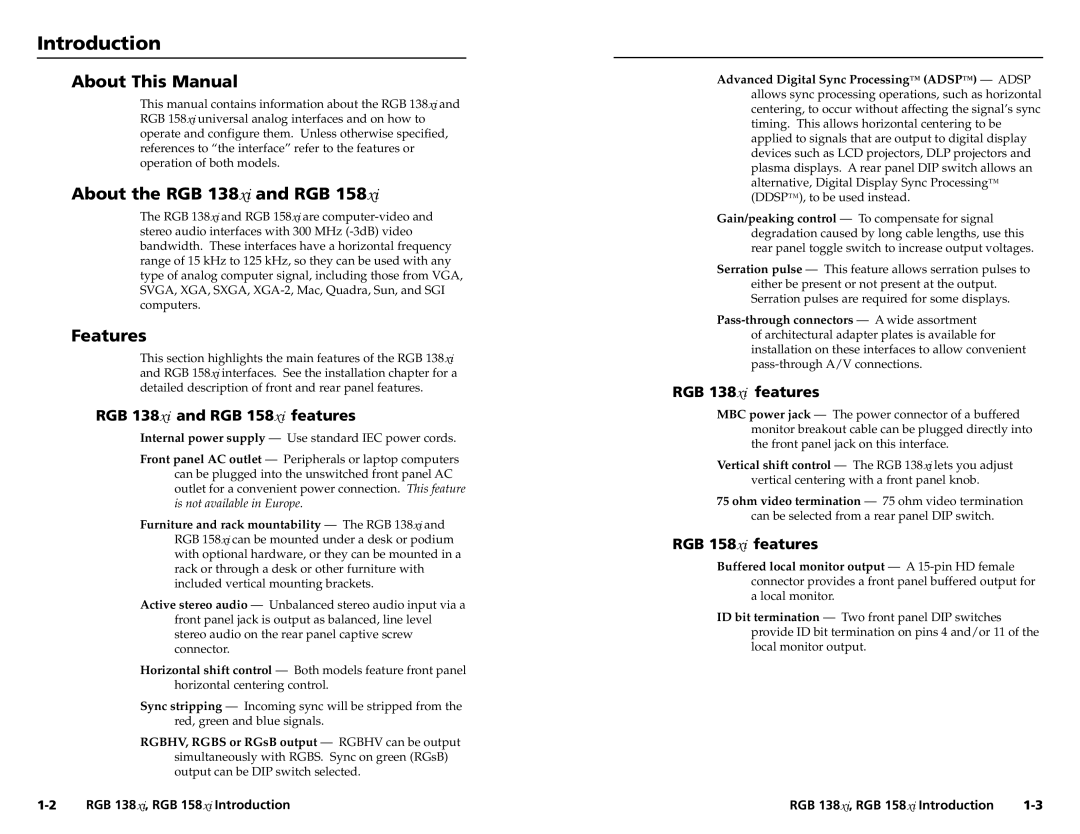Introduction
About This Manual
This manual contains information about the RGB 138xi and RGB 158xi universal analog interfaces and on how to operate and configure them. Unless otherwise specified, references to “the interface” refer to the features or operation of both models.
About the RGB 138xi and RGB 158xi
The RGB 138xi and RGB 158xi are
Features
This section highlights the main features of the RGB 138xi and RGB 158xi interfaces. See the installation chapter for a detailed description of front and rear panel features.
RGB 138xi and RGB 158xi features
Internal power supply — Use standard IEC power cords.
Front panel AC outlet — Peripherals or laptop computers can be plugged into the unswitched front panel AC outlet for a convenient power connection. This feature is not available in Europe.
Furniture and rack mountability — The RGB 138xi and RGB 158xi can be mounted under a desk or podium with optional hardware, or they can be mounted in a rack or through a desk or other furniture with included vertical mounting brackets.
Active stereo audio — Unbalanced stereo audio input via a
front panel jack is output as balanced, line level stereo audio on the rear panel captive screw connector.
Horizontal shift control — Both models feature front panel horizontal centering control.
Sync stripping — Incoming sync will be stripped from the red, green and blue signals.
RGBHV, RGBS or RGsB output — RGBHV can be output simultaneously with RGBS. Sync on green (RGsB) output can be DIP switch selected.
Advanced Digital Sync Processing™ (ADSP™) — ADSP allows sync processing operations, such as horizontal centering, to occur without affecting the signal’s sync timing. This allows horizontal centering to be applied to signals that are output to digital display devices such as LCD projectors, DLP projectors and plasma displays. A rear panel DIP switch allows an alternative, Digital Display Sync Processing™ (DDSP™), to be used instead.
Gain/peaking control — To compensate for signal degradation caused by long cable lengths, use this rear panel toggle switch to increase output voltages.
Serration pulse — This feature allows serration pulses to
either be present or not present at the output. Serration pulses are required for some displays.
RGB 138xi features
MBC power jack — The power connector of a buffered monitor breakout cable can be plugged directly into the front panel jack on this interface.
Vertical shift control — The RGB 138xi lets you adjust
vertical centering with a front panel knob.
75 ohm video termination — 75 ohm video termination can be selected from a rear panel DIP switch.
RGB 158xi features
Buffered local monitor output — A
ID bit termination — Two front panel DIP switches provide ID bit termination on pins 4 and/or 11 of the local monitor output.
RGB 138xi, RGB 158xi Introduction | RGB 138xi, RGB 158xi Introduction |
